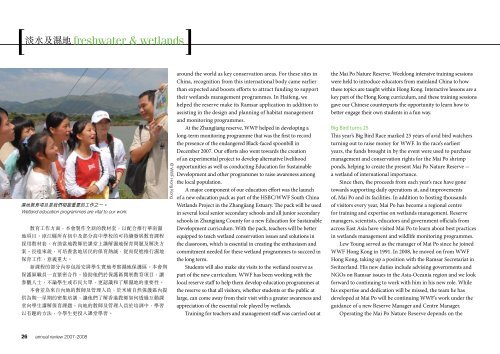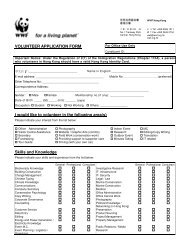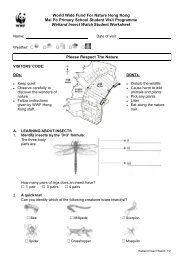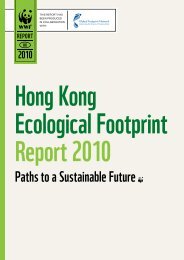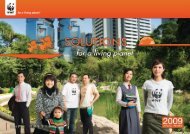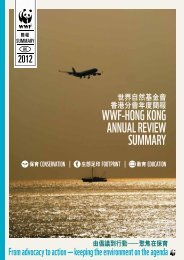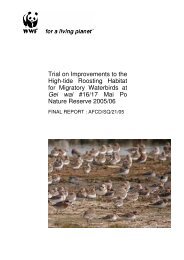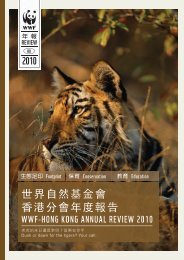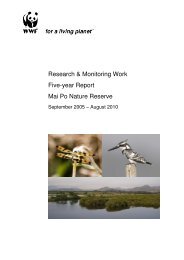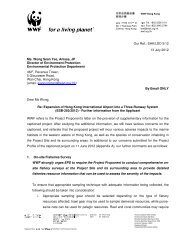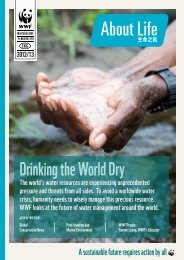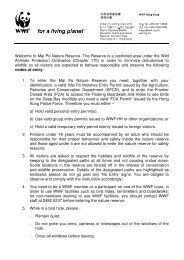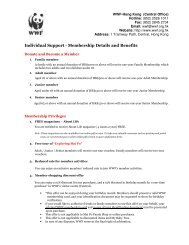å ¨çä¿è²å é© The planet's leading conservation organisation - WWF
å ¨çä¿è²å é© The planet's leading conservation organisation - WWF
å ¨çä¿è²å é© The planet's leading conservation organisation - WWF
Create successful ePaper yourself
Turn your PDF publications into a flip-book with our unique Google optimized e-Paper software.
淡 水 及 濕 地 freshwater & wetlands濕 地 教 育 項 目 是 我 們 相 當 重 要 的 工 作 之 一 。Wetland education programmes are vital to our work.教 育 工 作 方 面 , 本 會 製 作 全 新 的 教 材 套 , 以 配 合 推 行 華 南 濕地 項 目 。 漳 江 縣 所 有 初 中 及 部 分 高 中 學 校 的 可 持 續 發 展 教 育 課 程採 用 教 材 套 , 有 助 當 地 教 師 於 課 堂 上 講 解 濕 地 保 育 問 題 及 解 決 方案 。 長 遠 來 說 , 可 培 養 當 地 居 民 的 保 育 熱 誠 , 從 而 促 進 推 行 濕 地保 育 工 作 , 意 義 重 大 。新 課 程 的 部 分 內 容 包 括 安 排 學 生 實 地 考 察 濕 地 保 護 區 。 本 會 與保 護 區 職 員 一 直 緊 密 合 作 , 協 助 他 們 於 保 護 區 開 展 教 育 項 目 , 讓參 觀 人 士 , 不 論 學 生 或 市 民 大 眾 , 更 認 識 和 了 解 濕 地 的 重 要 性 。本 會 並 為 來 自 內 地 的 教 師 及 管 理 人 員 , 於 米 埔 自 然 保 護 區 內 提供 為 期 一 星 期 的 密 集 培 訓 , 讓 他 們 了 解 香 港 教 師 如 何 透 過 互 動 課堂 向 學 生 講 解 保 育 課 題 。 內 地 的 教 師 及 管 理 人 員 於 培 訓 中 , 學 習以 有 趣 的 方 法 , 令 學 生 更 投 入 課 堂 學 習 。© <strong>WWF</strong> Hong Kongaround the world as key <strong>conservation</strong> areas. For these sites inChina, recognition from this international body came earlierthan expected and boosts efforts to attract funding to supporttheir wetlands management programmes. In Haifeng, wehelped the reserve make its Ramsar application in addition toassisting in the design and planning of habitat managementand monitoring programmes.At the Zhangjiang reserve, <strong>WWF</strong> helped in developing along-term monitoring programme that was the first to recordthe presence of the endangered Black-faced spoonbill inDecember 2007. Our efforts also went towards the creationof an experimental project to develop alternative livelihoodopportunities as well as conducting Education for SustainableDevelopment and other programmes to raise awareness amongthe local population.A major component of our education effort was the launchof a new education pack as part of the HSBC/<strong>WWF</strong> South ChinaWetlands Project in the Zhangjiang Estuary. The pack will be usedin several local senior secondary schools and all junior secondaryschools in Zhangjiang County for a new Education for SustainableDevelopment curriculum. With the pack, teachers will be betterequipped to teach wetland <strong>conservation</strong> issues and solutions inthe classroom, which is essential in creating the enthusiasm andcommitment needed for these wetland programmes to succeed inthe long term.Students will also make site visits to the wetland reserve aspart of the new curriculum. <strong>WWF</strong> has been working with thelocal reserve staff to help them develop education programmes atthe reserve so that all visitors, whether students or the public atlarge, can come away from their visit with a greater awareness andappreciation of the essential role played by wetlands.Training for teachers and management staff was carried out atthe Mai Po Nature Reserve. Weeklong intensive training sessionswere held to introduce educators from mainland China to howthese topics are taught within Hong Kong. Interactive lessons are akey part of the Hong Kong curriculum, and these training sessionsgave our Chinese counterparts the opportunity to learn how tobetter engage their own students in a fun way.Big Bird turns 25This year’s Big Bird Race marked 25 years of avid bird watchersturning out to raise money for <strong>WWF</strong>. In the race’s earliestyears, the funds brought in by the event were used to purchasemanagement and <strong>conservation</strong> rights for the Mai Po shrimpponds, helping to create the present Mai Po Nature Reserve –a wetland of international importance.Since then, the proceeds from each year’s race have gonetowards supporting daily operations at, and improvementsof, Mai Po and its facilities. In addition to hosting thousandsof visitors every year, Mai Po has become a regional centrefor training and expertise on wetlands management. Reservemanagers, scientists, educators and government officials fromacross East Asia have visited Mai Po to learn about best practicesin wetlands management and wildlife monitoring programmes.Lew Young served as the manager of Mai Po since he joined<strong>WWF</strong> Hong Kong in 1991. In 2008, he moved on from <strong>WWF</strong>Hong Kong, taking up a position with the Ramsar Secretariat inSwitzerland. His new duties include advising governments andNGOs on Ramsar issues in the Asia-Oceania region and we lookforward to continuing to work with him in his new role. Whilehis expertise and dedication will be missed, the team he hasdeveloped at Mai Po will be continuing <strong>WWF</strong>’s work under theguidance of a new Reserve Manager and Centre Manager.Operating the Mai Po Nature Reserve depends on the26 annual review 2007-2008


